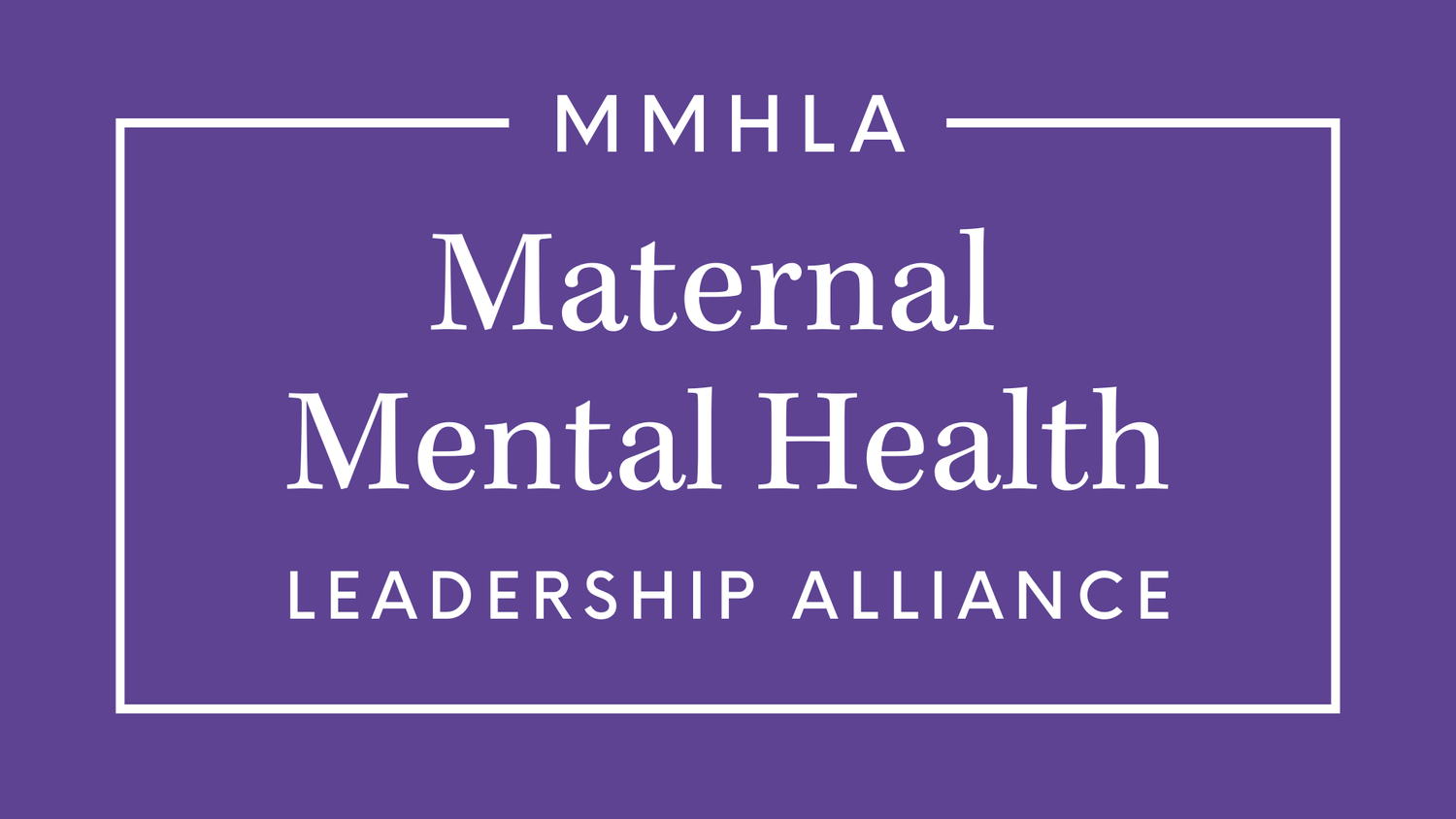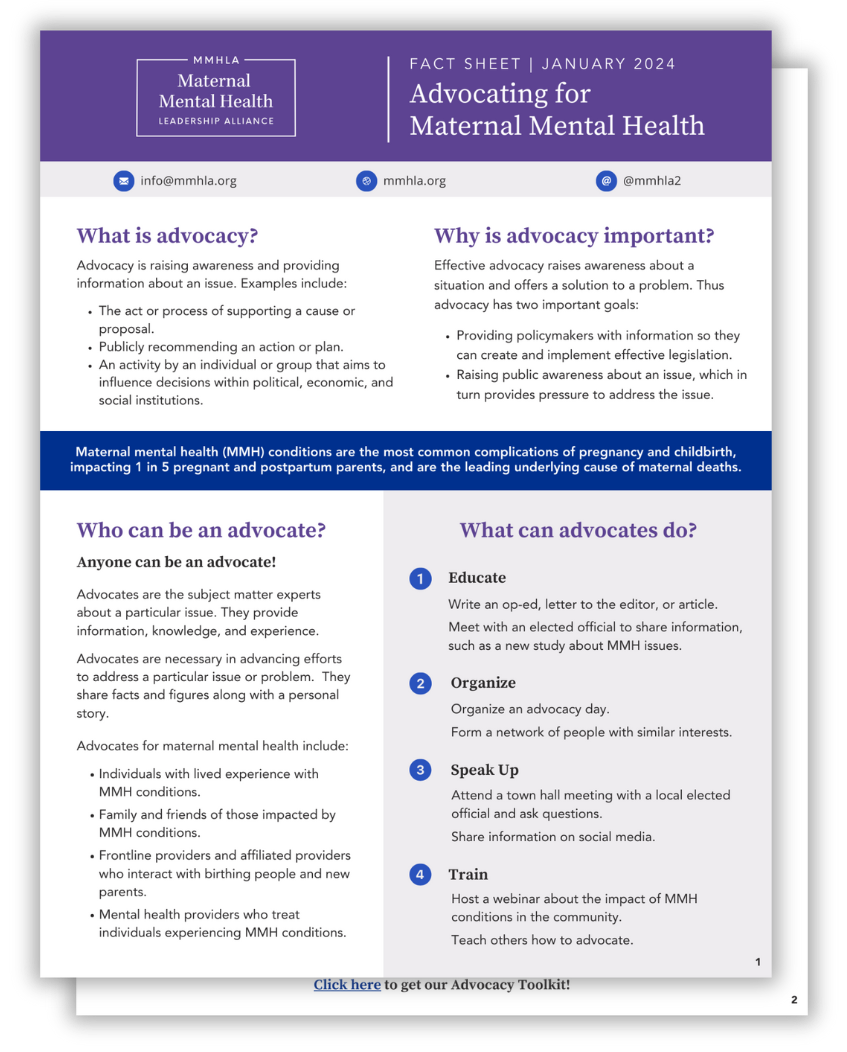Our Virtual Advocacy Day is on March 13th. Join Us!
At MMHLA, we advocate for national policies to provide universal, equitable, comprehensive, and compassionate mental health care during pregnancy and the year following pregnancy.
Since 2019, we have successfully advocated for over $200 million in federal funding to support maternal mental health programs.
Register for our Virtual Advocacy Day!
Each year, we organize a Virtual Advocacy Day to bring together individuals with lived experience, their families, and maternal-child and mental health professionals to meet with members of Congress and their staff.
This is an opportunity to directly communicate with our elected representatives and their staff about the importance of maternal mental health and to ask that they use their power and influence to fund critical maternal mental health programs.
A special thank you to Postpartum Support International and Mocha Moms, Inc. for partnering with us on this year's Advocacy Day!
Are you new to advocacy?
Don’t worry! Before Advocacy Day, we will host live trainings to provide you with all the information you need to be a confident advocate. You will:
Learn how to effectively tell your story and how to encourage your elected officials to fund MMH programs.
Be matched with experienced advocates based on your location.
Have your virtual meetings scheduled in advance by our team.
Who can be an advocate?
Anyone can be an advocate! Advocates are often individuals with lived experience and/or subject matter experts who provide information and knowledge, often speaking from experience. The most effective advocates use their personal story, along with facts and figures, to highlight an issue and suggest a solution.
What is MMHLA advocating for this year?
This year, we are advocating for:
(1) $10 Million for the National MMH Hotline
The Hotline (1-833-TLC-MAMA) provides 24/7 voice and text support to mothers and families impacted by MMH conditions. Since launching on Mother’s Day 2022, the Hotline has assisted more than 25,000 help-seekers, with response times less than 30 seconds.
Funding will be used to:
Support Hotline operations
Launch a national public awareness campaign about the Hotline
Train Hotline counselors on providing support to service members, veterans, and military families
(2) $24 Million for State MMH Programs
States have primarily used these federal grants to create perinatal psychiatry access programs, which are population-based programs that provide four key services:
Education about MMH to frontline providers
Real-time psychiatric consultation
Resources & referrals
Technical assistance
Funding will be used to:
Support 12 existing state programs
Launch additional programs
Provide coordination across programs
Offer technical assistance
Raise public awareness
Address disparities and substance use
Learn more about the State MMH Programs.
What is the difference between advocacy and lobbying?
Think of advocacy as education: Raising awareness and sharing information about a specific issue. The goal of advocacy is to ensure people have their voices heard.
Lobbying is a specific subset of advocacy that includes direct communication with an elected official (or staff) with a specific request about a piece of legislation. The goal of lobbying is to exert influence for or against a specific piece of legislation in a decision-making body.
Interested in learning more about advocacy? Check out our advocacy resources!
Advocating for Maternal Mental Health Fact Sheet
A brief 2-page overview about advocacy and lobbying.
Perinatal Mental Health Advocacy Toolkit
An in-depth, actionable guide with an overview, worksheets, and templates.
View resources
What are some other advocacy opportunities?
Advocacy can take many forms, including sharing a personal story, raising awareness, or providing feedback on research and reports. Here are two additional advocacy opportunities – take action today!
The United States Digital Service Team is working with the National Maternal Mental Health Task Force to better understand the maternal mental health journey with the goal of improving maternal mental health in the United States.
The goal is to interview mothers and their providers to learn about mental health screening and what happens after screening. Trauma-informed researchers will lead interviews and share sample questions ahead of time. Interviews last about an hour, and the team is interested in talking with:
Mothers or birthing people who have taken a mental health screening in the last two years.
Providers who support mothers who use Medicaid and have taken mental health screenings.
The Agency for Healthcare Research and Quality (AHRQ) is seeking public review and feedback on a report on Nonpharmacologic Treatments for Maternal Mental Health Conditions.
This report evaluates non-medical treatments, such as therapy and peer support, and their impact on mental health conditions during the perinatal period. Public feedback helps improve the relevance of reviews for healthcare decision making. All comments will be reviewed and considered. Comments are due February 26. 2024.
When did MMH Advocacy Day start?
Enjoy this throwback picture of the first Maternal Mental Health Advocacy Day in 2016, with thoughts from our Founder and Policy Director, Jamie Zahlaway Belsito.
What do you remember about the first MMH Advocacy Day in 2016?
The experience was incredible! It was the first time we came together in-person in Washington and there was so much energy and excitement. We brought advocates to Congress in May in recognition of Mother’s Day. Even though it was hot and humid, we enthusiastically stomped around Capitol Hill in sneakers, changing into our high heels in each office before meeting members of Congress. We had so much fun and made friends for life!
When and why did you start MMHLA?
I founded MMHLA to keep a focus on national policy around maternal mental health. After organizing MMH Advocacy Days in 2016 and 2017, I saw the need to keep a foot on the gas, ensuring that maternal mental health stayed on the national policy agenda.
Did you have any advocacy experience before starting MMHLA?
Yes! Before I got married and had my two daughters, I worked on immigration policy in Washington for 15+ years. That’s how I learned my way around Capitol Hill and how to effectively advocate for policy change. I bring my policy and lobbying experience together with my lived experience with MMH conditions to lead MMHLA’s advocacy and policy work.






